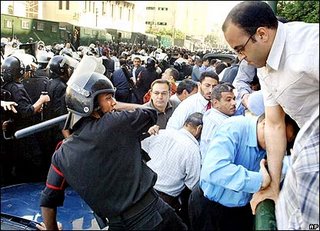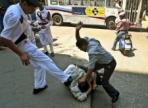- Promote friendly relations between the peoples of the USA and Syria
- Advance human rights, civil liberties, and democracy in Syria
- Encourage international cooperation, based on international law and justice
These were laudable goals, I thought, and the program looked interesting, so I decided to attend.
There were between 75-100 attendees. The organizers stated that the goal was to find ways in which Syrian-Americans can help promote reform in Syria but hoped to do achieve that in a non-confrontational way. The invited speakers were to include a spectrum of viewpoints but was most notable by those who were absent. Neither ambassador Imad Moustapha nor Bouthaina Shaaban made (scheduling conflict was the given reason; yeah, right!). Opposition member Riad Seif, with his passport confiscated could not attend and fearing his safety, understandably declined to address the meeting by phone. For similar reason neither could Jad al-Kareem al-Jibai, a human rights activists though he addressed the conference by phone from Damascus speaking fearlessly about the situation in Syria. There was a lively point counterpoint between Najib Ghadban, a fierce critic of the Syrian government and Muhammad Habash, an ostensibly independent member of parliament. The latter's glass half-full view of the Syrian regime led him to make inane justifications for the regime's behavior. Both Habash and David Lesch, author of The New Lion of Damascus, in response to a pointed question, seem to be smitten with Bashar (is he such a charmer? or is it Asma?). Lesch's presentation still left me wondering about the real Bashar. Perhaps I am making too much of Bashar the "enigma". I should take him at face value. After all, to be enigmatic implies a certain cleverness not evident in Bashar's disastrous serial political blunders. The most compelling presentation was that of Radwan Ziadah, director of the Damascus Center for Human Rights. A small and unassuming man, Radwan gave a very perceptive analysis of the state of human rights in Syria. Having recently signed the Beirut-Damascus declaration, he came to this meeting at great risk to himself.
So, what can Syrians, living so far actually do? SAC does not want to be viewed as part of the political opposition but nevertheless wants to promote change and reform. So, by necessity, it is limiting its work to only "non-controversial" issues such as economic and institutional reform, things that even a Baathist can comfortably pay lip service to. This greatly diminishes the second stated goal of its mission statement (promotion of human rights and democracy). SAC also needs a partner within Syria to assist in promoting change. NGOs would have been the appropriate partners but the regime has made it difficult for many NGOs to function properly. So who is left to partner with? Perhaps selected, reform minded, non-Baathist technocrats and independent members of parliament. Are there enough such people to work with? I am not certain.
Despite all these difficulties, perhaps SAC's Achilles heel is the fact that no matter how careful it is in its message, it will always perceived as foreign and therefore in the paranoid mindset of the regime, suspicious. It is after all the Syrian AMERICAN Congress. The absence of Moustapha and Shaaban from the proceedings is an early indication of the regime's disinterest.
Whether political change happens slowly and painfully or rapidly (and painfully), Syria is in need of reform in all aspects of its public life. I therefore fully support the intentions of the SAC although I am skeptical that, in the current climate, anyone can, from the outside, assist in reforming the system from within.
One thing I am certain about after this meeting, though, is that there are righteous people working within such as Jad al-Jibai and Radwan Ziadah whose tenacity and courage astound me. These are the true Lions of Damascus and they deserve our full support.


